
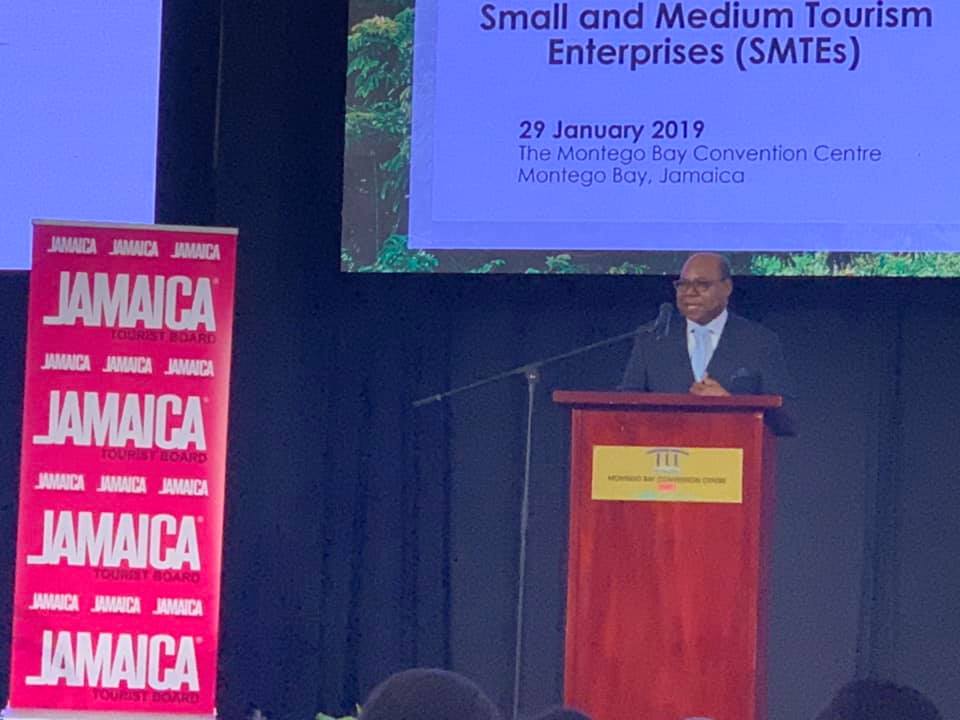
Small- and Medium-sized Businesses are Vital Sources of Stability
With a record-breaking 4.31 million travelers visiting Jamaica in 2018, the island nation’s tourism industry is poised to boost its rate of growth by expanding investments in small- and medium-sized business enterprises (SMTEs), said Jamaica’s Tourism Minister, the Hon. Edmund Bartlett, CD, MP.
Min. Bartlett spoke today at the “Second Global Conference on Jobs and Inclusive Growth: Small and Medium Tourism Enterprises,” which was co-presented by the United Nations World Tourism Organization (UNWTO) and Jamaica’s Ministry of Tourism.
More than 80 percent of tourism is driven by small- and medium-sized enterprises in Jamaica.
“Increasing investment in national economies and its citizens will only result in having greater resources to provide an enhanced visitor experience,” said Min. Bartlett. “Here in Jamaica, it is through a broad range of strategies such as education, specialized training, and credit financing that is enabling us to professionalize Jamaica’s tourism industry, so more of our citizens can be on par with travel professionals around the world.”
More than 200 SMTE members convened at the Montego Bay Convention Centre, in Montego Bay, Jamaica, to participate in discussions led by an impressive roster of local and international speakers and panelists that included: Jamaica’s Minister of Industry Audley Shaw, CD, MP; Jaime Cabal, Deputy Secretary-General, UNWTO; Nestor Mendez, Assistant Secretary General of the Organization of American States; and keynote remarks by Álvaro Uribe Vélez, the former President of Colombia.
“The small- and medium-business sector contributes most to Jamaica tourism, yet only 20 percent of SMTE revenue returns to their benefit,” added Min. Bartlett. “Today, we recharged the dialogue on how to rebalance that anomaly and to back good ideas with investment capital.” He said strategies are in place to allow SMTEs to understand their potential, thereby moving from “mom-and-pop” operators to established, reliable sources of sustainable and long-term income.
Recently, the Ministry of Tourism has directed nearly J$1Billion into the Export–Import Bank of the United States for lending at a rate of four-and-a-half percent to Jamaica’s SMTEs, which has generated an overwhelming response from local small business owners. “To date some J$950 million has been lent to more than 70 entities and they are also making repayments with interest. By April, J$132 million in interest would have been repaid,” Min. Bartlett said.
In addition, the Organisation of American States (OAS) committed a total of US$500,000 to build the resilience of SMTEs to natural disasters and disruptions to tourism. The project, which is being executed over two years, is funded by the United States Department of State and managed by the OAS Secretariat for Integral Development.
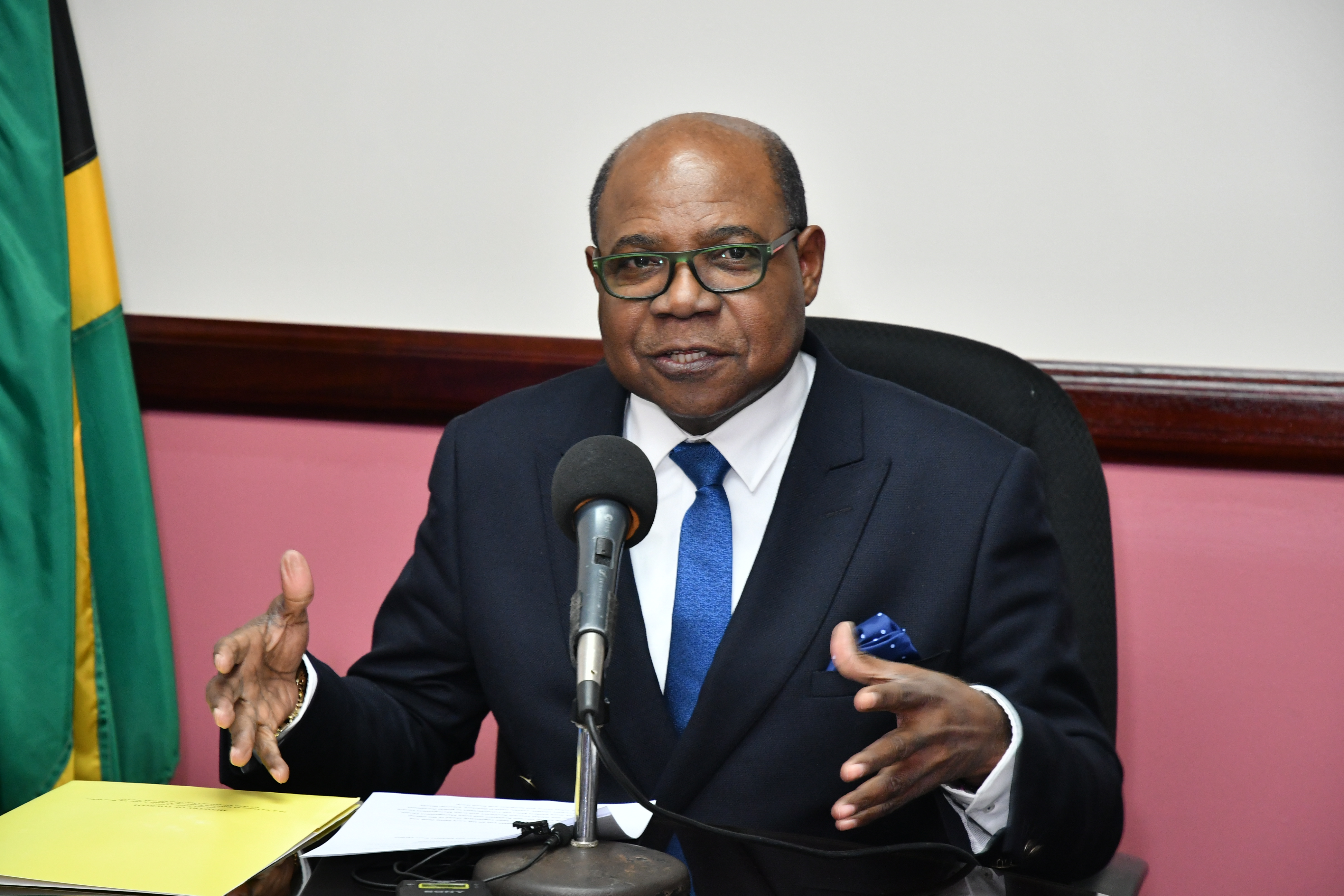
Jamaica PM speaks at launch of Global Tourism Resilience & Crisis Management Centre
At the launch of the Global Tourism Resilience & Crisis Management Centre, Jamaica Prime Minister Hon. Andrew Holness shared his thoughts on the importance of the work being initiated today through this Centre not only for tourism, but for the global economy as well.
“Over the last several years, governments and societies have become increasingly aware of the need to mainstream resilient strategies in their everyday operations. Faced with a wide range of dynamic threats, the global economy has become far more volatile and increasingly uncertain. Consequently, policymakers across all economic sectors globally are facing unprecedented demands to insure that strategies promoting resilience, mitigation, and adaptation are central to their agendas for achieving sustainable resilience.
“Of all the major industries globally, arguably none faces greater exposure to disruptive forces than the hyper-connected tourism sector. The irony of the tourism industry is that the tourism sector has also displayed this uncanny ability to recover. So there is just something about tourism that is resilient. It is the most exposed but has also demonstrated the greatest ability to recover.
“And in speculating, I was in the room when Peter [Tarlow] offered his thesis as to why this may be, and Richard in his doctoral thesis delivering here today, might have suggested that it is because travel is so important to the global economy, that policymakers go the extra mile to insure that whenever there is a global disaster that is disruptive and dislocating that we put in place very quickly the measures to open up the government or open back the government. So the thesis offered by Peter is that the government of the United States reopened as soon as it was clear that airports were about to shut down, and that is indeed the hope of travel and tourism and insuring that we and recover quickly.
“The most recent data provided by the UNWTO found that in 2018 the tourism sector grew by 4.6 percent, and that was much faster than the global economy. For Jamaica over the last 10 years, our tourism industry grew by 36 percent. That’s amazing! While the rest of the overall economy over the last 10 years grew by 6 percent. So tourism is the standout performer.
“To reinforce the point, in the last decade, Jamaica suffered terribly in the last global recession. Luckily, our financial sector did not suffer as badly as others, but the rest of our economy plummeted in 2009. In fact the latest data is showing that we are just now recovering ground where our economy has grown back to where it was in 2009 at the start of the recession. But tourism has just grown leaps and bounds, and that reinforces the point that there can be all kinds of shots to the economy, and many industries will take far longer to recover, but tourism has managed to recover very quickly. So for policymakers it is important that we study this phenomenon, we understand it, and we properly document it and assimilate it, and mainstream it into our practices to insure that whatever kind of disaster may affect us, we can actually recover.
“So, I’m very impressed with the work that is going to be done by the Resilience Center, not just for tourism but more importantly lessons that other industries can learn about speed of recovery after disasters and building in redundancies and protocols to insure that we have resilience and sustainability. It is a very important institution, and I am very happy that we initiated it and we have actually executed the Centre being launched here today.”
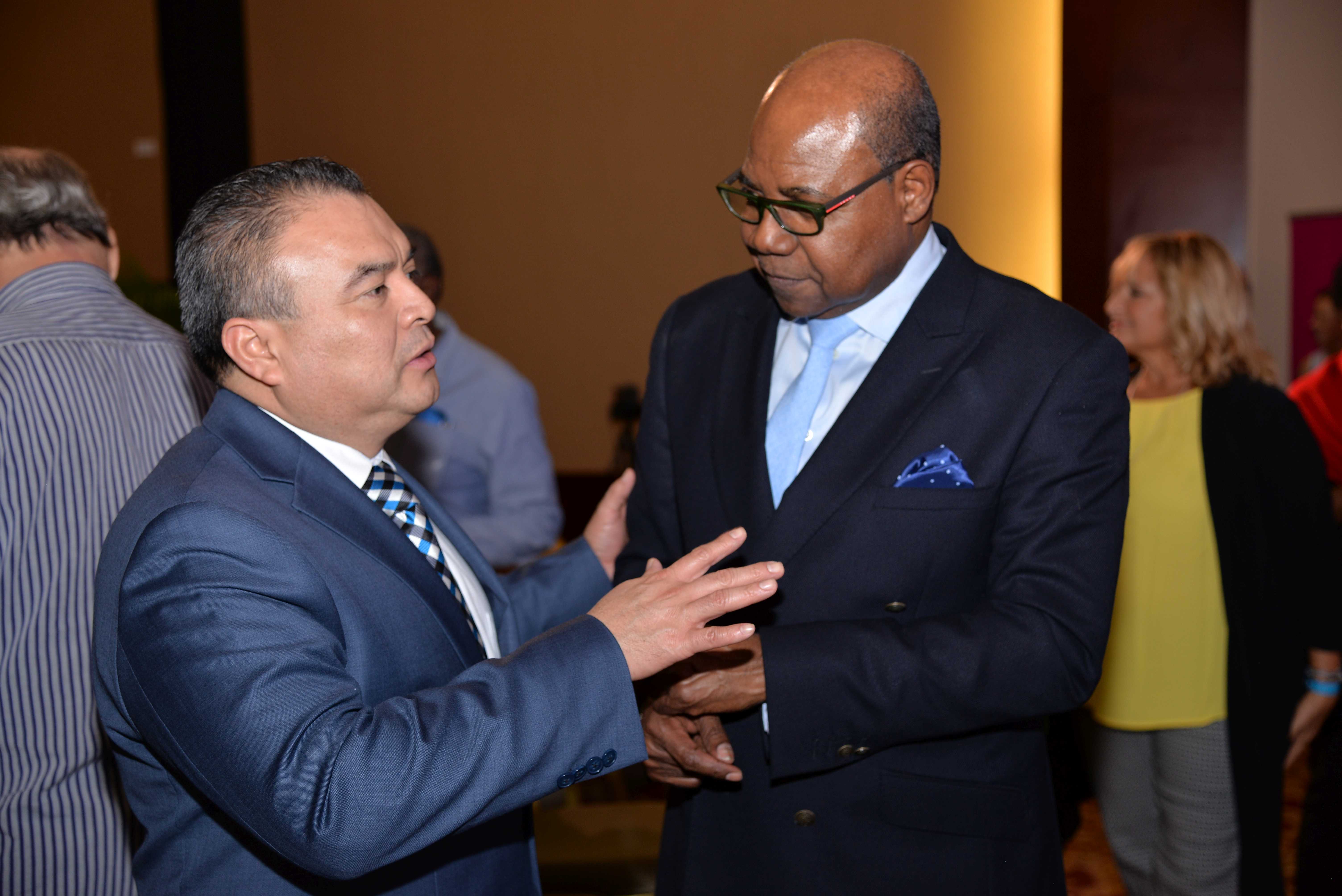
Building Resilience of Caribbean SMTEs: OAS launches $500,000 project
The Organization of American States (OAS) has launched a US$500,000 project to assist the region’s small and medium tourism enterprises (SMTEs) to build resilience to natural disasters.
The project was launched during the 2nd Global Conference on Jobs and Inclusive Growth: Small and Medium Tourism Enterprises (SMTEs), hosted at the Montego Bay Convention Centre by the government and the United Nations World Tourism Organization on January 29.
Speaking ahead of the launch, Tourism Minister Hon. Edmund Bartlett said, “We are so happy to have the vast expertise of the Assistant Secretary General of the Organization of American States (OAS), Nestor Mendez, at the launch who I am pleased to say comes bearing gifts. This very important resilience project for our SMTEs will help build the capacity of our sector to better help us become more resilient when disruptions occur.”
The project is funded by the United States Department of State and managed by the OAS Secretariat for Integral Development. It will assist small tourism enterprises in the Caribbean to overcome the various challenges that affect the ability of Governments and businesses alike to continue their business operations during and after catastrophic events in the Caribbean.
Participating countries set to benefit include: Antigua and Barbuda, The Bahamas, Belize, Barbados, Dominica, Grenada, Haiti, St. Lucia, St. Kitts and Nevis, St. Vincent and the Grenadines, Suriname, and Trinidad and Tobago.
It will be carried out in a two-year period, with the primary aim being to reduce the severity, impact and duration of disruptions caused by a disaster on the operations of the small enterprises in the Caribbean.
“The Caribbean is among the most tourism-dependent regions in the world and there is no other region whose travel and tourism industry is as vulnerable to disasters as the Caribbean. It is undeniable that climate change presents an existential threat to small island developing states and low lying coastal areas, which include the countries of the Caribbean,” said Assistant Secretary General of the OAS, Nestor Mendez.
He also noted that “The OAS identified, among the main long-term needs of the region, the need for tourism-related disaster preparedness and crisis management, communications plans as well as methodologies to follow before and after a disaster.”
This 2nd Global Conference on Jobs and Inclusive Growth: Small and Medium Tourism Enterprises (SMTEs), is a direct response to the global conference on jobs and inclusive growth hosted in Jamaica in 2017, which brought to the fore many of the perennial challenges faced by SMTEs, including issues of access to credit, marketing, technology and business development.
The conference organisers therefore saw it prudent to have another event focused solely on SMTEs and best practices that have direct relevance to their development.
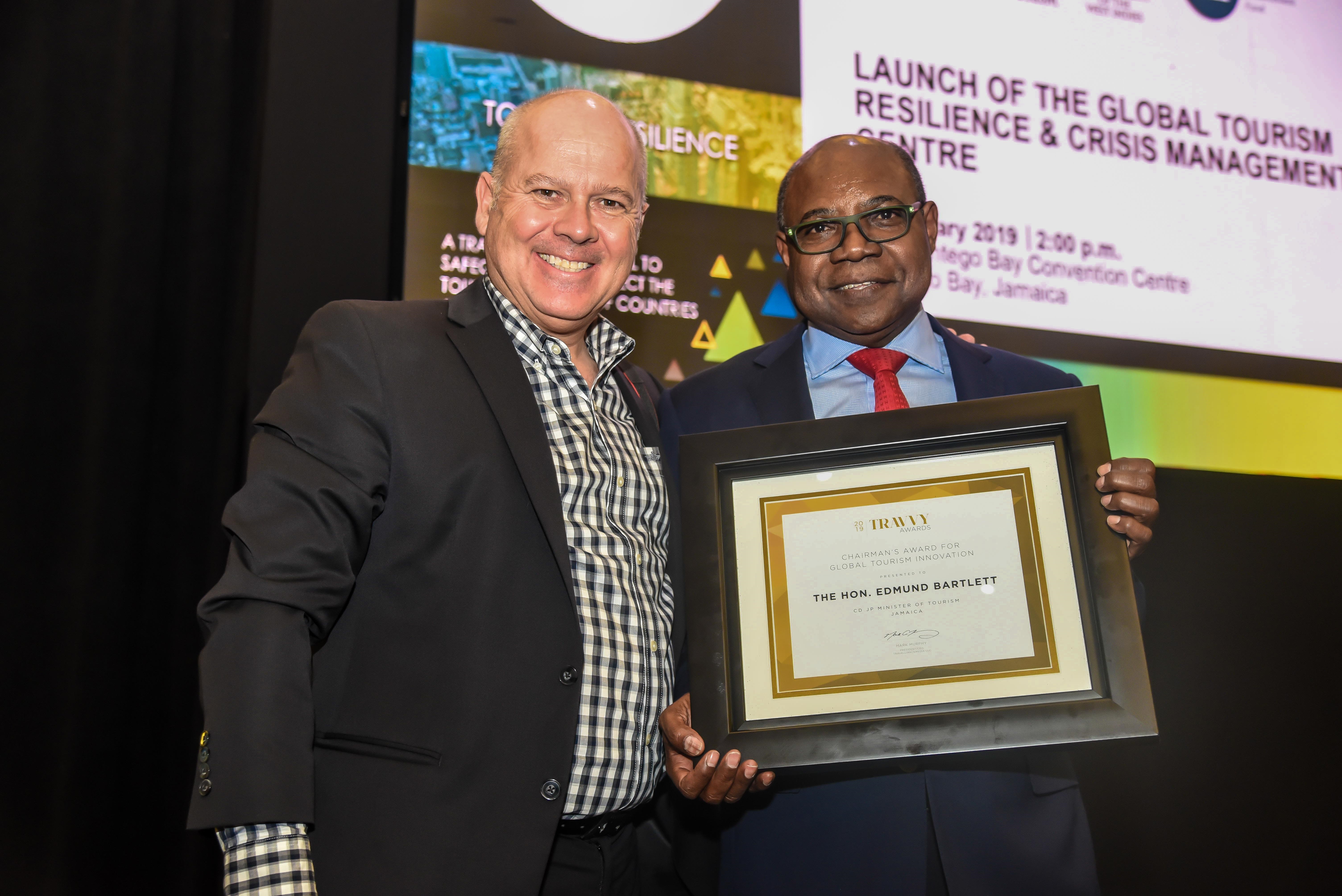
Jamaica’s Tourism Minister Bartlett receives TRAVVY Award for Global Tourism Innovation
Jamaica’s Tourism Minister, Hon. Edmund Bartlett was officially presented with 2019 TRAVVY Awards inaugural Chairman’s Award for Global Tourism Innovation for the development of the Global Tourism Resilience and Crisis Management Center (GTRCMC) during the launch of the Center on January 30 at the Montego Bay Convention Centre. The award was presented by John Kirk, President and Editor-in-Chief of TravelPulse Canada.
During the official ceremony, which took place last Wednesday in New York, the Jamaica Tourist Board (JTB) also won the best Tourist Board in the Caribbean award, while Jamaica also won: Best Wedding Destination; Best Honeymoon Destination; and Best Culinary Destination, to thunderous applause from the packed hall of primarily American travel industry stakeholders.
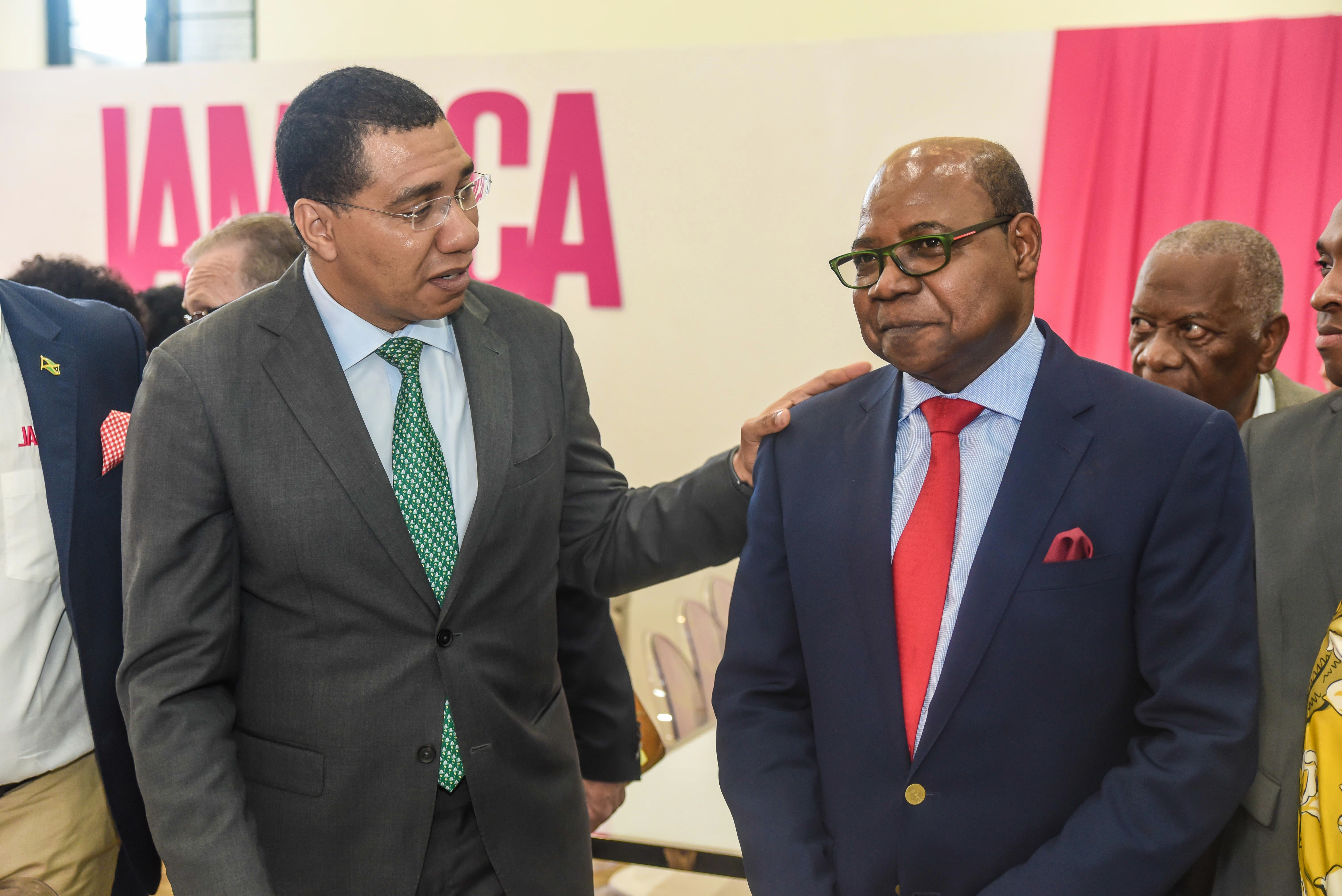
Jamaica Prime Minister calls for greater collaboration for sustainable resilience in tourism sector
Prime Minister of Jamaica, the Most Hon. Andrew Holness says that greater effort has to be placed in strengthening linkages with key industries to create a more resilient and sustainable tourism industry.
“Crisis management requires coordination and a joint-up approach from the point of view of government and stakeholders. So it is important that we get all stakeholders on board. I am very pleased with the performance of the tourism industry but tourism does not exist in a vacuum by itself.eTN Chatroom: Discuss with readers from around the world:
It has to coordinate with all the agencies and so a part of the ability to be more resilient, and to adapt is how we connect and create linkages. Resilience depends on the Ministry of Health, the Ministry of National Security, the Ministry of Science and Technology, and the Ministry of Education. Greater effort has to be placed in ensuring that, if we are going to be effective in managing crises, “said the Prime Minister.
The Prime Minister made these remarks during the launch of the Global Resilience and Crisis Management Centre at the Montego Bay Convention Centre on January 30, 2019.
“Jamaica’s strategy is not just to ensure that Jamaica is safe, but to collaborate with all other countries…visitors to the island can rest assured that they are in a safe, secure and healthy environment,” said Prime Minister Holness.
The focus of the Centre will include: Risk Assessment, Mapping and Planning; Cyberspace Policy and Counter-Terrorism; Resilience-Related Research Collaborations; Development of Innovation Systems; Coordinating resilience policies with the government, Resource Mobilization, Capacity Building and Cross-Border Intelligence-sharing.
Speaking at the launch, Tourism Minister, Hon. Edmund Bartlett said, “There are four key deliverables that the Centre is focusing on at this time. One, is the establishment of an academic journal, which will be a compendium of scholarly publications, on various elements of the 5 segments of disruptions. The editorial board has already been established, headed by Professor Lee Miles of Bournemouth University, with the assistance of George Washington University. Within the next four months, that journal will be ready,” said the Minister.
The other deliverables include: a compendium of best practices/ a blueprint for resilience; a resilience barometer to measure the resilience in countries and provide benchmarks to guide countries; and to establish an academic chair at the University of West Indies for innovation and resilience.
“I am pleased to announce that we have two proposals before us for the funding of that Chair. One is from Spain and the other is from Jamaica. We are still looking because part of what we must have are the resources to manage the facilities over time,” said the Minister.
The Centre which is housed at the University of the West Indies, will be staffed by local, regional and internationally recognized experts and professionals in the fields of climate management, project management, tourism management, tourism risk management, tourism crisis management, communication management, tourism marketing and branding as well as monitoring and evaluation.
“We are looking forward to the work that is going to be done and we want to work closely with the University of the West Indies because we believe it will be beneficial for us to understand how the rest of Government can benefit from the lessons that you can teach us, to ensure that we are resilient and can manage crises,” said the Prime Minister.
The Centre will also provide research fellowship opportunities for individuals seeking to either expand their knowledge or, gain experience in tourism resilience and crisis management, through postdoctoral research, and internships for undergraduate and graduate students in fields of study related to tourism resilience and crisis management.
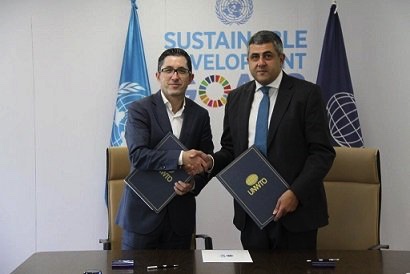
San Sebastian hosts UNWTO World Forum on Gastronomy Tourism
The World Tourism Organization (UNWTO) and the Basque Culinary Center (BCC) have signed the Agreement for the holding of the 5th UNWTO World Forum on Gastronomy Tourism (San Sebastian, Spain 2-3 May 2019). The new edition of this global forum is supported by the Ministry of Industry, Commerce and Tourism of Spain, the Basque Government, the Provincial Council of Gipuzkoa and the City of San Sebastián.
Job creation and the promotion of entrepreneurship will be this year’s special focus, in line with the 2019 UNWTO Year of Education, Skills and Jobs, closely aligned with the Sustainable Development Goals (SDGs). The forum will bring together Ministers of Tourism, representatives from National and Local Tourism Administrations, chefs, entrepreneurs, academia and related stakeholders from tourism and gastronomy to discuss latest trends and to share experience.eTN Chatroom: Discuss with readers from around the world:
The event will see the announcement of the winner of the First Gastronomy Tourism Start-up Competition. The competition, organized by UNWTO and the BCC, will bring five finalists to San Sebastian.
“Tourism is a huge source of employment and its multiplier effect has a knock-on effect on other sectors, such as gastronomy and its huge value chain involving several sectors”, said UNWTO Secretary-General Zurab Pololikashvili.
“We are especially proud to be co-organizers of the 5th UNWTO World Forum of Gastronomy Tourism. An edition that returns to San Sebastian and that grows exponentially thanks to the support of the Ministry of Industry, Commerce and Tourism of Spain, the Basque Government, the Provincial Council of Gipuzkoa and the City of Donostia. Tourism today is a sector closely linked to gastronomy. At the Basque Culinary Center, we promote knowledge through training in both sectors and work to create an ecosystem that stimulates entrepreneurship and ensures quality employment”, underlined Joxe Mari Aizega, Director, Basque Culinary Center.
Policy framework for the development of gastronomy tourism and its capacity to create jobs and promote entrepreneurship, future skills, as well as ways to support SMEs and entrepreneurships in gastronomy tourism will be addressed as well during the forum. The panel presentations will be complemented by working sessions giving all participants the opportunity to actively immerse, interact and share ideas.
The event will close with a Masterclass by the Basque Culinary Center on how to develop competitive and sustainable gastronomy tourism in destinations.
The Forum has been held since 2015.The Basque Culinary Center hosts it every two years with the aim to promote the exchange the most relevant experiences between experts in tourism and gastronomy, to identify best practices and to promote gastronomy tourism as a contributor to sustainable development.
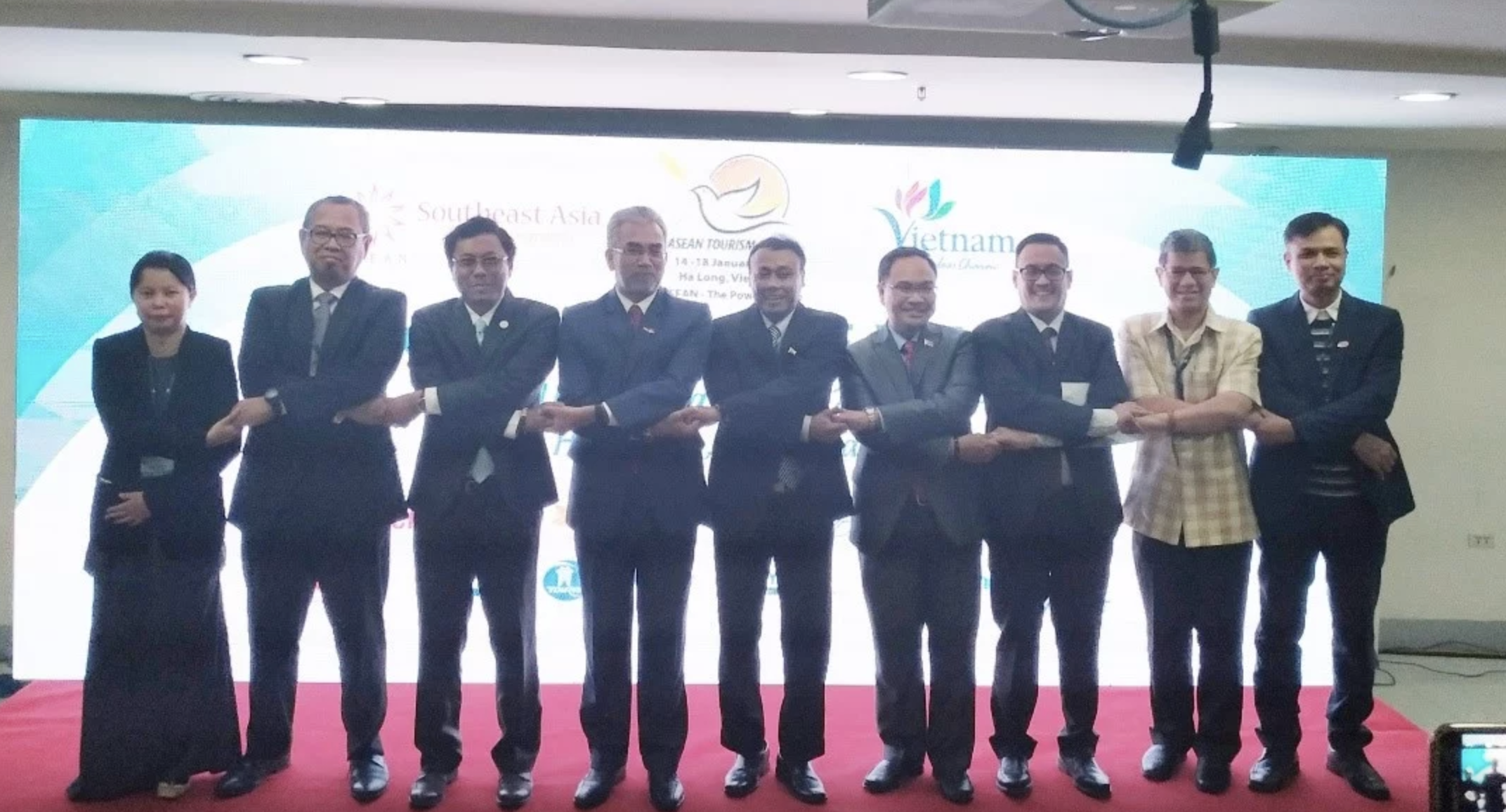
ASEAN Tourism Forum a successful cooperation of 10 nations
The ASEAN Tourism Forum (ATF) is a cooperative regional effort to promote the Association of Southeast Asian Nations (ASEAN) as one tourist destination. This annual event involves all the tourism industry sectors of the 10 member states of ASEAN: Brunei Darussalam, Cambodia, Indonesia, Lao PDR, Malaysia, Myanmar, the Philippines, Singapore, Thailand and Viet Nam.
This year, the event was held in Halong Bay in Viet Nam, and each of the 10 ASEAN countries utilized the Forum to highlight their focus areas.eTN Chatroom: Discuss with readers from around the world:
The Member States agreed that they must continue to collectively innovate and seek meaningful initiatives to increase tourism growth while retaining the heritage, tradition, and identity that makes the region unique for future generations.
Member state Brunei, officially the Sultanate of Brunei Darussalam, is also known as the Abode of Peace, which is the Arabic translation for Darussalam. It focused on the 2020 ATF for which the theme will be: ASEAN – together towards a next generation of travel. Minister Apong, the Minister of Primary Resources and Tourism, spoke of the aim of the 2020 event which will reinforce the ASEAN mission and objectives that were set out in 1967.
Indonesia spoke of its strategy to reach 20 million tourists in 2019 through digital tourism, millennial tourism, and nomadic tourism. It wants to develop 10 more islands like Bali, by implementing the 3 “A”s – attraction, amenity, and accessibility with cross-border tourism as a focus.
Malaysia had a strong presence at the Forum, with leadership being present along with 33 sellers. The Desaru Coast, a new integrated resort and one of Malaysia’s most anticipated new tourism developments got prominent exposure, as did Johar for exciting and enjoyable adventures.
The presence of a large gathering at Ha Long Bay was utilized by Cambodia to create greater awareness of the Cambodia Travel Mart (CTM) which is scheduled to be held in Phnom Penh from October 10 to 13, 2019. The CTM will also be the mechanism used to strengthen a tourism cooperation and to push for a tourism promotion within ASEAN and in the region, said Minister of Tourism Thong Khon, inviting delegates to attend the 3rd CTM event.
As the host nation, Vietnam received much attention, and the country went all out to make the event memorable and to tell the world that tourism is very important to them. The country welcomed 15.5 million travelers, a 20 percent increase in arrivals in 2018. Nearly 5 million visitors came from China, a 23.9 percent increase; 3.5 million from Korea, a 30.4 percent increase; 827,000 from Japan, a 3.6 percent increase; and 606,000 from Russia, a 5.7 percent increase, with Germany, France and the UK also showing significant boosts in arrivals.
The International Travel Expo, Ho Chi Minh City (ITE HCMC) 2019, Mekong’s largest travel event, scheduled to be held from September 5 to 7, 2019, was also being marketed at ATF.

UNWTO: Citizens recognize positive impact of tourism sector
According to the first ever global survey conducted by the World Tourism Organization (UNWTO) and IPSOS, 47% of respondents think ‘they live in cities with a high number of tourists’. Over 50% considers tourism has a positive impact in generating wealth and promoting cultural exchanges, and 49% feel there should be measures to improve tourism management. Only 12% of respondents favor limitations to the number of visitors.
The online survey was conducted across 15 countries and targeted 12,000 people to better understand residents’ perception towards city tourism, its impacts and management strategies.eTN Chatroom: Discuss with readers from around the world:
“Today, adequately managing tourism to the benefit of visitors and residents alike, ensuring that local communities are listened to and benefit from tourism is more important than ever, said UNWTO Secretary-General Zurab Pololikashvili. “There is a pressing need to set a roadmap for urban tourism which is fully aligned with the urban agenda”, he added.
Nearly half of the respondents (47%) think ‘they live in a city with a high number of visitors. Yet, results vary significantly across countries, ranging from 68% in Australia to only 33% in France.
The generation of wealth and income, the creation of intercultural exchanges and of new offers of leisure activities stand out as the biggest impacts on cities. The perception of tourism’s positive impacts is particularly strong in Argentina, Australia, the Republic of Korea, Spain, and Sweden.
For many urban destinations around the world, addressing the challenges of growing tourism demand and adequately managing tourist flows is now a priority. In a similar way, the results show that 49% of respondents feel that there should be measures to better manage tourism. Again, values change significantly by country – from 75% in Argentina to only 24% in Japan.
Of all respondents, over 70% think these measures should focus on improving infrastructure and facilities as well as in creating attractions for both tourists and residents. Only 12% think measures should include the limitation of the number visitors and only 9% considered that tourism promotion should be stopped.
Key findings:
• 47% of respondents think “they live in a city with a high number of tourists visiting”
• The mixed-picture of the perceived impacts rising from urban tourism in the different countries demonstrates the complexity of economic, social and environmental issues faced by destinations today.
• On the positive side, 52% think tourism has a big or moderate impact in generating wealth and income. On the other spectrum, 46% think it “creates overcrowding”.
• 49% of respondents think “there should be measures to manage tourism”
• Respondents are most receptive to the following measures: ‘improve infrastructures and facilities’ (72%), ‘create experiences and attractions that benefit both residents and visitors’ (71%), and ‘ensure local communities benefit from tourism’ (65%).
• Results also show that half of responses emphasized communicating and engaging with local communities (50%) and visitors (48%) as an important measure, whereas only 12% think there should be a ‘limit to the number of tourists’ and only 9% think tourism promotion should be stopped.
The UNWTO / IPSOS survey on was part of the IPSOS Online omnibus (Global@dvisor) December 2018 wave (fieldwork between 21 January 2018 and 14 January 2019.
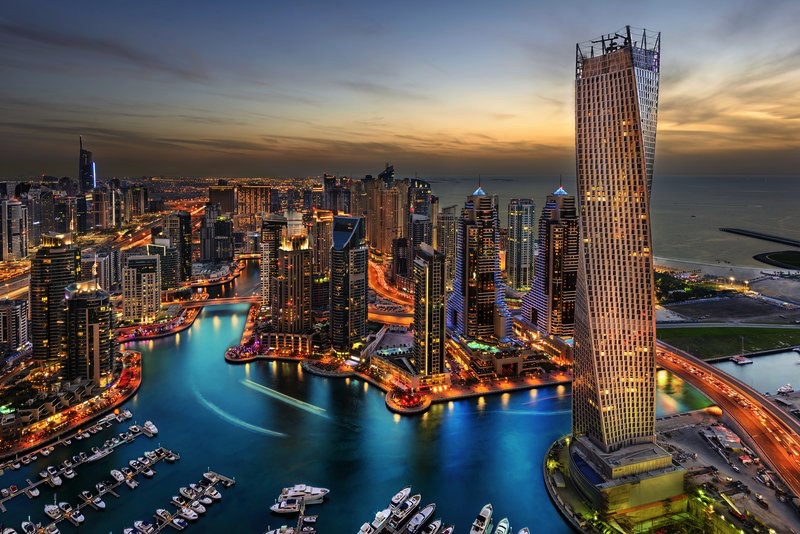
UNWTO: International tourist arrivals reach 1.4 billion two years ahead of forecasts
International tourist arrivals grew 6% in 2018, totalling 1.4 billion according to the latest UNWTO World Tourism Barometer. UNWTO’s long term forecast issued in 2010 indicated the 1.4 billion mark would be reached in 2020, yet the remarkable growth of international arrivals in recent years has brought it two years ahead.
International tourist arrivals up 6% in 2018e
UNWTO estimates that worldwide international tourist arrivals (overnight visitors) increased 6% to 1.4 billion in 2018, clearly above the 3.7% growth registered in the global economy.
In relative terms, the Middle East (+10%), Africa (+7%), Asia and the Pacific and Europe (both at +6%) led growth in 2018. Arrivals to the Americas were below the world average (+3%).
“The growth of tourism in recent years confirms that the sector is today one of the most powerful drivers of economic growth and development. It is our responsibility to manage it in a sustainable manner and translate this expansion into real benefits for all countries, and particularly, to all local communities, creating opportunities for jobs and entrepreneurship and leaving no one behind” said UNWTO Secretary-General Zurab Pololikashvili. “This is why UNWTO is focussing 2019 on education, skills and job creation.”, he added.
UNWTO’s long-term forecast published in 2010 predicted the 1.4 billion mark of international tourist arrivals for 2020. Yet stronger economic growth, more affordable air travel, technological changes, new businesses models and greater visa facilitation around the word have accelerated growth in recent years.
Results by region
International tourist arrivals in Europe reached 713 million in 2018, a notable 6% increase over an exceptionally strong 2017. Growth was driven by Southern and Mediterranean Europe (+7%), Central and Eastern Europe (+6%) and Western Europe (+6%). Results in Northern Europe were flat due to the weakness of arrivals to the United Kingdom.
Asia and the Pacific (+6%) recorded 343 million international tourist arrivals in 2018. Arrivals in South-East Asia grew 7%, followed by North-East Asia (+6%) and South Asia (+5%). Oceania showed more moderate growth at +3%.
The Americas (+3%) welcomed 217 million international arrivals in 2018, with mixed results across destinations.
Growth was led by North America (+4%), and followed by South America (+3%), while Central America and the Caribbean (both -2%) reached very mixed results, the latter reflecting the impact of the September 2017 hurricanes Irma and Maria.
Data from Africa points to a 7% increase in 2018 (North Africa at +10% and Sub-Saharan +6%), reaching an estimated 67 million arrivals.
The Middle East (+10%) showed solid results last year consolidating its 2017 recovery, with international tourist arrivals reaching 64 million.
Growth expected to return to historical trends in 2019
Based on current trends, economic prospects and the UNWTO Confidence Index, UNWTO forecasts international arrivals to grow 3% to 4% next year, more in line with historic growth trends.
As a general backdrop, the stability of fuel prices tends to translate into affordable air travel while air connectivity continues to improve in many destinations, facilitating the diversification of source markets. Trends also show strong outbound travel from emerging markets, especially India and Russia but also from smaller Asian and Arab source markets.
At the same time, the global economic slowdown, the uncertainty related to the Brexit, as well as geopolitical and trade tensions may prompt a “wait and see” attitude among investors and travelers.
Overall, 2019 is expected to see the consolidation among consumers of emerging trends such as the quest for ‘travel to change and to show’, ‘the pursuit of healthy options’ such as walking, wellness and sports tourism, ‘multigenerational travel’ as a result of demographic changes and more responsible travel.
“Digitalization, new business models, more affordable travel and societal changes are expected to continue shaping our sector, so both destination and companies need to adapt if they want to remain competitive”, added Pololikashvili.

UNWTO Activities at FITUR 2019
UNWTO Activities at FITUR 2019
- Inauguration of a tourism innovation hub
- The final stage of the 1st UNWTO Tourism Startup Competition
- The 10th Edition of The Tourism Investment and Business Forum for Africa
- Understanding the success of Asian Tourism
Madrid, Spain, 17 January – These will be among the activities led by the World Tourism Organization (UNWTO) during the 39th edition of the International Tourism Trade Fair in Madrid (FITUR, 23-27 January), the first of the world’s major annual tourism events.
A new activity this year is the inauguration of a global tourism innovation hub, highlighting the UNWTO’s role in and commitment to innovation. Furthermore, the awards ceremony of the 1st UNWTO Tourism Startup Competition will be held in partnership with Globalia, the leading tourism group in Spain and Latin America. This competition, the first and largest initiative of its kind in the world, is aimed at identifying the new companies that will lead the transformation of the tourism sector and the promotion of innovation ecosystems through tourism.
Celebrating its tenth edition, the Tourism Investment and Business Forum for Africa (INVESTOUR) has consolidated itself as the annual event that brings together numerous tourism ministers of the region and investors to discuss the opportunities that the sector can offer the continent. Organized jointly by the UNWTO, FITUR and Casa África, this year’s sessions will be structured around two main themes: “Safe and Seamless Travel in Africa: Fostering Resilience and Risk Management in the Tourism Sector” and “Embracing Digital Transformation, Innovation and Promoting Niche Tourism Products”.
